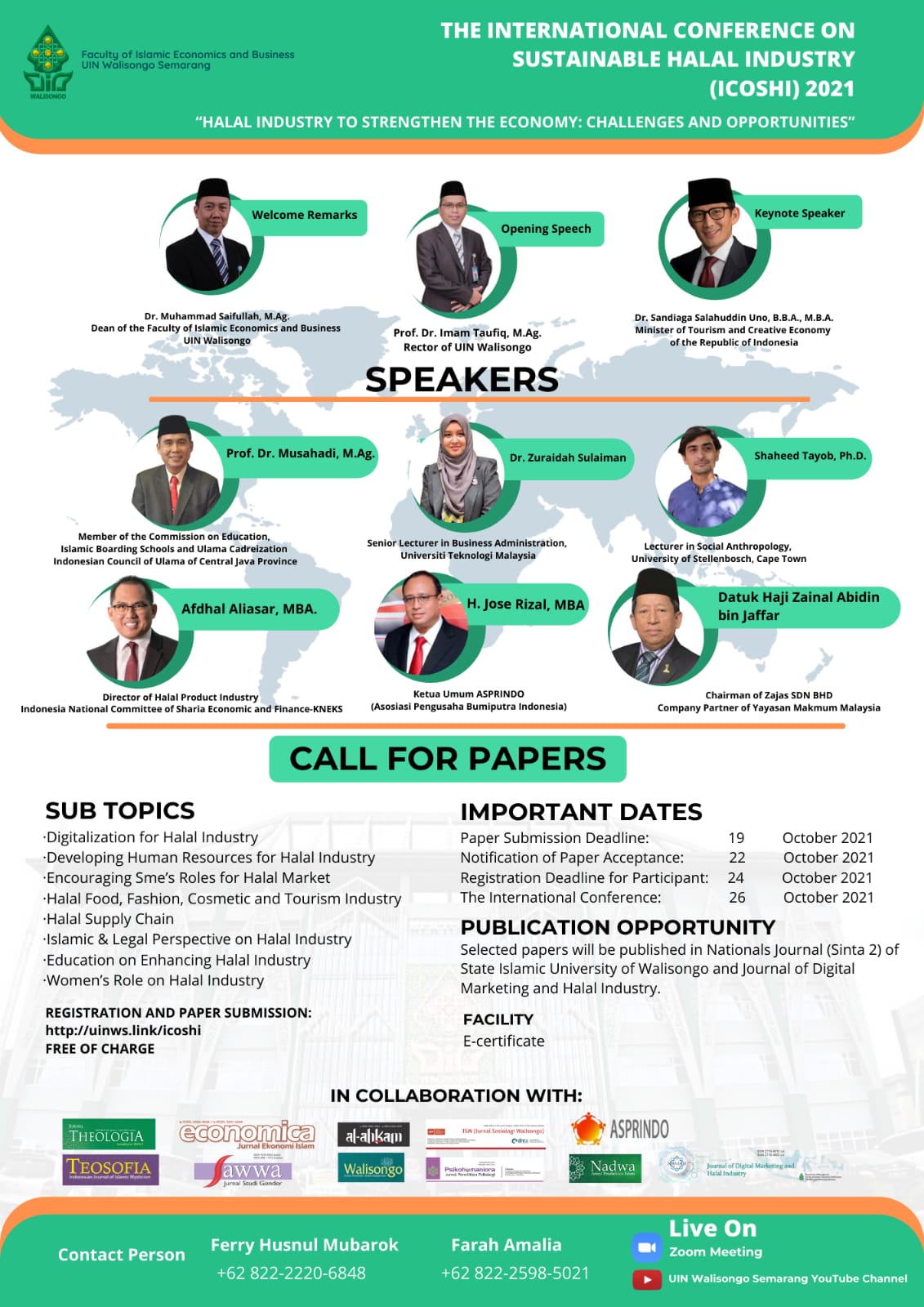THE 1ST INTERNATIONAL CONFERENCE ON SUSTAINABLE HALAL INDUSTRY
THEME
“HALAL INDUSTRY TO STRENGTHEN THE ECONOMY: CHALLENGES AND OPPORTUNITIES”
BACKGROUND
The Economic development basically includes economic growth, which is a goal that every country in the world wants to achieve. On the other hand, economic development creates side effects in the form of environmental problems, especially the natural environment. Thus, the concept of sustainable development emerged that seeks to achieve development goals without ignoring environmental factors. According to the official United Nations definition, sustainable development is defined as development that meets the needs of the present without compromising the ability of future generations to meet their needs. Recently, the term SDGs or (sustainable development goals) emerged. The SDGs were originally an initiative of the United Nations (UN) which began in 2012. The United Nations recommended all countries to adopt the SDGs consisting of 17 (seventeen) achievements. The development of the Halal Industry has progressed very rapidly, more or less in the last 10 years. The trend of the Halal industry has become a hot topic in the international business world today. The sale and purchase of halal products reached $254 billion and boosted the economy 1-3% of GDP (Gross Domestic Product) in member countries of the OIC (Organization of Islamic Conference) (Dinar Standard 2019). Islam as rahmatan lil 'alamin has regulated the lives of its people not only about worship but includes all parts of life such as meeting the needs of Muslims' lives. Halal in terminology means something that can be useful and does not hurt the body, mind and religion (Ngah, B. B. & Abdelali B. Z. 2019). Consumption is one of the pillars in the Islamic economy that must be in accordance with the halal concept (Insani, T.D. et al.2019). This is explained in the Qur'an in the letter Al-Baqarah verse 168 "O people! Eat from (food) which is lawful and good (Thayyib)". There are 3 aspects of halal and thayyib, namely not containing haram elements, providing positive impact benefits, and not hurting the mind and body. At this time the halal industry is developing, initially the halal industry only operates in the food sector, then develops into the finance sector and finally develops in the lifestyle sector, including tourism. Halal tourism is part of an industry that is aimed at Muslim tourists, which in service refers to Islamic rules that are set according to the Shari'a, such as the existence of halal-certified restaurants, halal-certified hotels, the availability of mosques in public places, the existence of separate swimming pool facilities for men. and women, the absence of liquor (containing alcohol), Islamic finance and others. In 2019 the Ministry of Tourism noted that there were 37 sharia hotels that have been certified halal and 150 hotels are heading for sharia operations, there are also 2916 restaurants, 303 have been certified halal and 1800 are preparing for certification. The growth of the halal industry reached 3.2 percent throughout 2020 or higher than the world economic growth in 2019 which was 2.3 percent.Indonesia is the largest exporter of halal economic products among other Muslim-majority countries with a value of USD7.6 billion in 2017. This strengthens Indonesia's basic position as the engine of the world's halal economy. This is an opportunity to produce halal products for international needs that are always increasing from year to year.In the future, Asia is expected to be a pioneer for this industry through the advancement of innovative halal products and even greater development strategies. That way, Asia can become a leader in the global halal industry because the opportunities are big and very possible to achieve. Based on the above background, the Faculty of Islamic Economics and Business UIN Walisongo Semarang Indonesia is organizing an international conference to create a space for academic conversation as an effort to generate ideas for the future of sustainable halal industry in Asia. The International conference also aims to develop scientific frameworks, enhance institutional capacities, and foster academic international cooperation.OBJECTIVES
- Provide understanding to the academic community and practitioners about various problems and challenges in the development of a sustainable halal industry.
- Exploring various contributive and solution thoughts to answer various challenges in the development of the halal industry in strengthening the economy
- Produce various researches that contain contemporary issues related to the theme of sustainable halal industry which can then be published in several accredited journals.
TIME AND PLACE:
International ConferenceDay/Date : Tuesday 26 October 2021
Time : 08.00 – 15.00
Place : Zoom Meeting
CONFERENCE PANELS:
Eight sub-topics will be conferred at the panel sessions during the conference. The committee is currently putting up a request for academic papers or articles based on the topics as listed below:
- DIGITALIZATION FOR HALAL INDUSTRY
- DEVELOPING HUMAN RESOURCES FOR HALAL INDUSTRY
- ENCOURAGING SME’S ROLES FOR HALAL MARKET
- FOOD, FASHION, COSMETIC AND TOURISM HALAL INDUSTRY
- HALAL SUPPLY CHAIN
- ISLAMIC & LEGAL PERSPECTIVE ON HALAL INDUSTRY
- EDUCATION ON ENHANCING HALAL INDUSTRY
- WOMEN’S ROLE ON HALAL INDUSTRY
SPEAKERS:
- Dr. Sandiaga Salahudin Uno (Ministry of Tourism and Creative Economy)
- Shaheed Tayob PhD (Stellenbosch University)
- Datuk Haji Zainal Abidin Bin Jaffar (Halal Industry in Malaysia/Zajas SDN BHD- Yayasan Makmum Malaysia)
- Dr.Zuraidah Sulaiman (Universiti Teknologi Malaysia)
- Afdhal Aliasar,MBA (National Committee of Shariah Economy and Finance- KNEKS)
- Prof.Dr. Musahadi (Indonesian Council of Ulama-MUI)
SUBMISSION OF PAPERS
Abstracts of 300-400 words in English
PARALLEL SESSION
CONFERENCE FACILITIES
- Certificate
- Publication Opportunity for selected papers
ORGANIZER
- The Faculty of Islamic Economics and Business of State Islamic University of Walisongo
- Yayasan Makmum Malaysia
- National Committee of Shariah Economy and Finance-KNEKS Journals of State Islamic University of Walisongo
- SINTA 2 Journals of State Islamic University of Walisongo
 WCIS : Walisongo Conference Information System
WCIS : Walisongo Conference Information System
